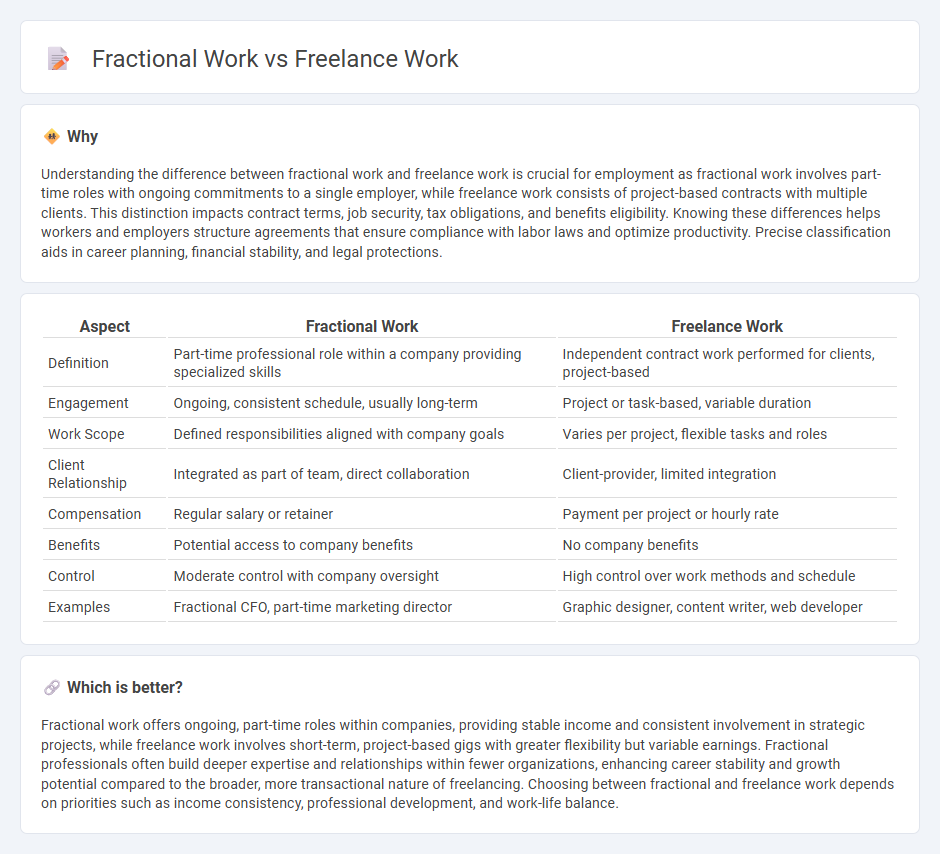
Fractional work involves professionals committing a set portion of their time to a single company, offering specialized expertise on a part-time basis, while freelance work consists of individuals providing services to multiple clients independently without long-term commitments. Fractional employees often integrate closely with organizations, contributing to strategic goals, whereas freelancers prioritize project-based tasks with flexible schedules. Explore the distinctions between fractional and freelance work to determine which model best suits your career objectives.
Why it is important
Understanding the difference between fractional work and freelance work is crucial for employment as fractional work involves part-time roles with ongoing commitments to a single employer, while freelance work consists of project-based contracts with multiple clients. This distinction impacts contract terms, job security, tax obligations, and benefits eligibility. Knowing these differences helps workers and employers structure agreements that ensure compliance with labor laws and optimize productivity. Precise classification aids in career planning, financial stability, and legal protections.
Comparison Table
| Aspect | Fractional Work | Freelance Work |
|---|---|---|
| Definition | Part-time professional role within a company providing specialized skills | Independent contract work performed for clients, project-based |
| Engagement | Ongoing, consistent schedule, usually long-term | Project or task-based, variable duration |
| Work Scope | Defined responsibilities aligned with company goals | Varies per project, flexible tasks and roles |
| Client Relationship | Integrated as part of team, direct collaboration | Client-provider, limited integration |
| Compensation | Regular salary or retainer | Payment per project or hourly rate |
| Benefits | Potential access to company benefits | No company benefits |
| Control | Moderate control with company oversight | High control over work methods and schedule |
| Examples | Fractional CFO, part-time marketing director | Graphic designer, content writer, web developer |
Which is better?
Fractional work offers ongoing, part-time roles within companies, providing stable income and consistent involvement in strategic projects, while freelance work involves short-term, project-based gigs with greater flexibility but variable earnings. Fractional professionals often build deeper expertise and relationships within fewer organizations, enhancing career stability and growth potential compared to the broader, more transactional nature of freelancing. Choosing between fractional and freelance work depends on priorities such as income consistency, professional development, and work-life balance.
Connection
Fractional work and freelance work both offer flexible employment models enabling professionals to engage with multiple clients or projects without full-time commitment. Fractional work typically involves part-time roles in specialized areas, providing consistent, ongoing engagement, whereas freelance work often consists of project-based tasks with varying durations. Both forms support workforce agility and allow businesses to access expert skills on-demand, optimizing employment efficiency.
Key Terms
Autonomy
Freelance work offers maximum autonomy with complete control over project selection, schedules, and client relationships, allowing professionals to tailor their workload independently. Fractional work balances autonomy with structured commitments by providing ongoing support to organizations in specific roles but less freedom in project choice compared to freelancing. Explore the key differences in autonomy between freelance and fractional work to determine which model best fits your career goals.
Time Commitment
Freelance work typically involves flexible hours with projects varying in intensity and duration, allowing professionals to choose assignments based on availability. Fractional work demands a fixed, recurring time commitment, often resembling part-time roles within a company, ensuring consistent involvement over weeks or months. Explore detailed comparisons to determine which model aligns better with your time management and career goals.
Scope of Responsibility
Freelance work typically involves project-based tasks with clearly defined deliverables and limited long-term responsibility, while fractional work entails a dedicated role with ongoing duties comparable to a part-time employee, often managing broader business functions. The scope of responsibility in fractional roles includes strategic decision-making, team collaboration, and consistent contribution to company goals, contrasting with the task-specific nature of freelance assignments. Explore more about how these differences impact your hiring strategy and business growth.
Source and External Links
How To Find Online Freelance Jobs (Plus 15 Websites To Use) - Explains what online freelance jobs are, how to find them, lists types of freelance work like writing, graphic design, and how to develop a clientele for flexible remote work.
The 10 Best Freelance Jobs in Demand - Bill.com - Lists in-demand freelance jobs such as web design, graphic design, editing, virtual assistant, and financial consulting, highlighting potential earning areas and skills required.
Freelance Jobs on Upwork: Work Remote & Earn Online - Showcases a wide variety of freelance job categories available on Upwork, including creative, technical, administrative, and legal roles, allowing freelancers to connect with businesses worldwide.
 dowidth.com
dowidth.com